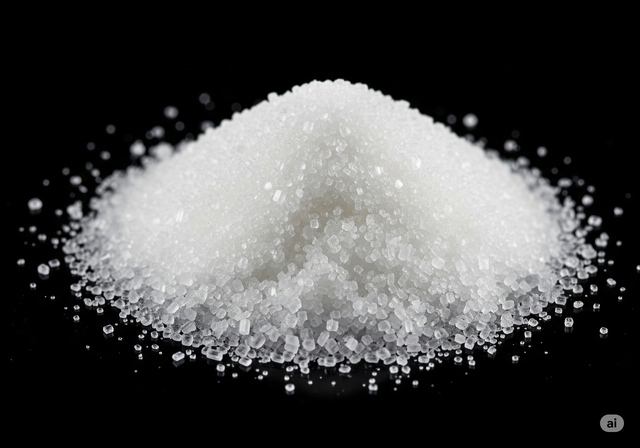However, consuming too much sugar or too often will cause many negative effects on health, according to the health website Verywell Health .
Brittany Poulson, a nutritionist working in the US, said that immediately after eating, sugar begins to enter the blood and is usually processed within 2 to 3 hours, but this time can be longer depending on many factors such as the type of food, metabolism, physical activity and health status of the consumer.

Consuming too much sugar will cause many negative effects on health.
Photo: AI
How does the body process sugar?
When you eat a food containing sugar or carbohydrates, your digestive system breaks down the carbohydrates into glucose in the small intestine.
Glucose is rapidly absorbed into the blood, causing blood sugar levels to rise.
The pancreas immediately secretes insulin - a hormone that plays a role in bringing glucose from the blood into the cells. Here, glucose will be used to create energy or stored for later use.
The rate at which glucose enters the bloodstream depends on the type of sugar and the food source. Simple sugars such as those found in candy, cakes, and soft drinks often cause blood sugar to rise rapidly within 15 to 30 minutes of eating.
In contrast, carbohydrates from whole grains that are high in fiber and protein are digested more slowly, causing blood sugar to rise gradually. After about 60 minutes, blood sugar levels peak.
For healthy people, the body will return blood sugar levels to normal in about 2 to 3 hours. If the meal contains a lot of refined starch or added sugar, the processing time may be longer.
What affects how long sugar stays in the blood?
The composition of your meal plays a very important role. Combining carbohydrates with fiber, fat or protein slows the absorption of sugar, helping to maintain more stable blood sugar levels.

Walking 10 minutes after a meal helps the body use glucose faster, reducing the time sugar stays in the blood.
Photo: AI
Physical activity is also key. Exercise after meals, such as a 10-minute walk, helps the body use glucose more quickly, reducing the time it stays in the blood. People who exercise regularly are better able to regulate blood sugar.
Metabolic status and insulin sensitivity determine the ability to process sugar. People with good metabolic health will return their blood sugar to normal quickly. Meanwhile, people with insulin resistance, prediabetes, or diabetes will take longer, sometimes up to several hours.
Additionally, older adults or those who are overweight or obese often have a slower response to insulin, which delays sugar processing. Additionally, chronic stress and lack of sleep increase stress hormones, making blood sugar harder to control.
Where does sugar go in the body?
After insulin moves glucose from the blood into the cells, the body uses the sugar in several ways. If energy is needed, the cells will use glucose immediately.
When glucose is not needed, it is stored in the liver and muscles as glycogen. When the glycogen stores are full and the body is not active, the excess sugar is converted to fat and stored over time.
Source: https://thanhnien.vn/duong-ton-tai-trong-co-the-bao-lau-185250721102921336.htm









































































































Comment (0)